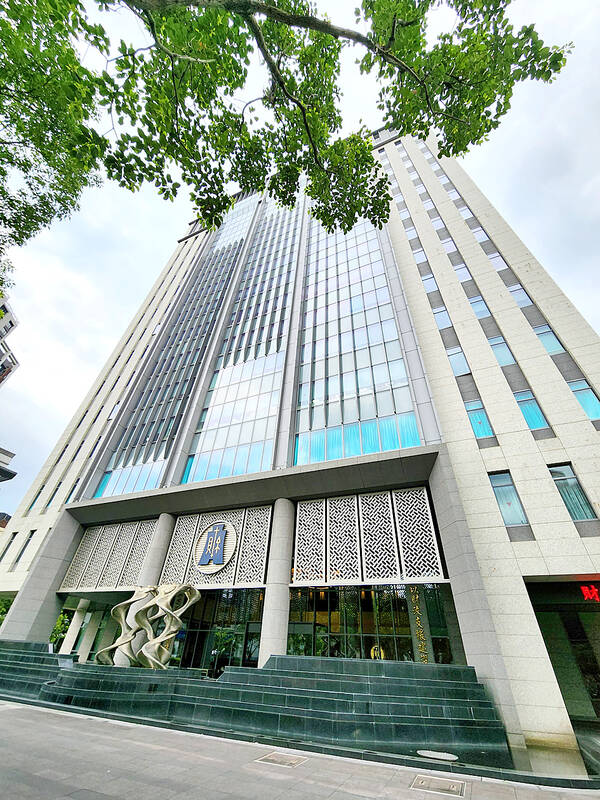Tax revenue last month rose 3 percent from a year earlier to NT$170.3 billion (US$5.33 billion), aided by active stock trading and vehicle sales, the Ministry of Finance said on Tuesday.
The increase came even though corporate income tax revenue declined 2.4 percent annually to NT$14.3 billion and personal income tax revenue dropped 10.5 percent year-on-year to NT$81.9 billion, as listed firms distributed less cash dividends, the ministry said.
Securities transactions generated NT$22.1 billion in tax revenue last month, spiking 56.1 percent from a year earlier and rising for a fourth consecutive month, as companies associated with artificial intelligence (AI) saw their share prices spike and listed exchange-traded funds touting high cash dividends gained immense popularity, ministry statistics official Liang Kuan-shuan (梁冠璇) said.

Photo: Chang Chia-ming, Taipei Times
AI-related firms, many of which supply servers and devices used in PCs and peripheral products, accounted for 32 percent of stock turnover last month, an unprecedented phenomenon, Liang said.
The AI hype helped drive average daily turnover on the local stock market up 55.5 percent year-on-year to NT$392.1 billion last month, ministry data showed.
In the first eight months of the year, securities transaction tax revenue increased 4.3 percent to NT$128.9 billion, Liang said, adding that it was the second-highest level ever recorded and not far off the ministry’s full-year target of NT$155.1 billion.
Sales of imported vehicles proved another bright spot, helping hoist sales tax revenue 5.7 percent to NT$14.4 billion and tariffs 11.3 percent to NT$15.1 billion last month, she said.
Automakers and dealers remain upbeat about vehicle sales and the national treasury would receive further support, Liang said.
Cumulative tax revenue in the first eight months totaled NT$2.46 trillion, representing an 8.7 percent increase from the same period last year and ahead of the government’s budget goal by 15.5 percent, the ministry said.

UNCERTAINTY: Innolux activated a stringent supply chain management mechanism, as it did during the COVID-19 pandemic, to ensure optimal inventory levels for customers Flat-panel display makers AUO Corp (友達) and Innolux Corp (群創) yesterday said that about 12 to 20 percent of their display business is at risk of potential US tariffs and that they would relocate production or shipment destinations to mitigate the levies’ effects. US tariffs would have a direct impact of US$200 million on AUO’s revenue, company chairman Paul Peng (彭雙浪) told reporters on the sidelines of the Touch Taiwan trade show in Taipei yesterday. That would make up about 12 percent of the company’s overall revenue. To cope with the tariff uncertainty, AUO plans to allocate its production to manufacturing facilities in

Taiwan will prioritize the development of silicon photonics by taking advantage of its strength in the semiconductor industry to build another shield to protect the local economy, National Development Council (NDC) Minister Paul Liu (劉鏡清) said yesterday. Speaking at a meeting of the legislature’s Economics Committee, Liu said Taiwan already has the artificial intelligence (AI) industry as a shield, after the semiconductor industry, to safeguard the country, and is looking at new unique fields to build more economic shields. While Taiwan will further strengthen its existing shields, over the longer term, the country is determined to focus on such potential segments as

COLLABORATION: Given Taiwan’s key position in global supply chains, the US firm is discussing strategies with local partners and clients to deal with global uncertainties Advanced Micro Devices Inc (AMD) yesterday said it is meeting with local ecosystem partners, including Taiwan Semiconductor Manufacturing Co (TSMC, 台積電), to discuss strategies, including long-term manufacturing, to navigate uncertainties such as US tariffs, as Taiwan occupies an important position in global supply chains. AMD chief executive officer Lisa Su (蘇姿丰) told reporters that Taiwan is an important part of the chip designer’s ecosystem and she is discussing with partners and customers in Taiwan to forge strong collaborations on different areas during this critical period. AMD has just become the first artificial-intelligence (AI) server chip customer of TSMC to utilize its advanced

While China’s leaders use their economic and political might to fight US President Donald Trump’s trade war “to the end,” its army of social media soldiers are embarking on a more humorous campaign online. Trump’s tariff blitz has seen Washington and Beijing impose eye-watering duties on imports from the other, fanning a standoff between the economic superpowers that has sparked global recession fears and sent markets into a tailspin. Trump says his policy is a response to years of being “ripped off” by other countries and aims to bring manufacturing to the US, forcing companies to employ US workers. However, China’s online warriors